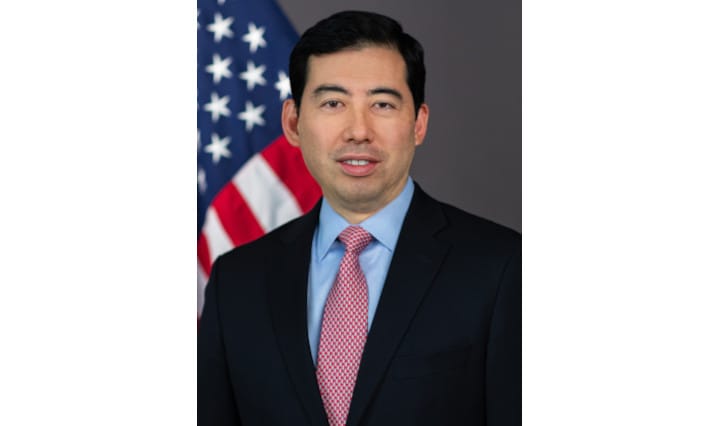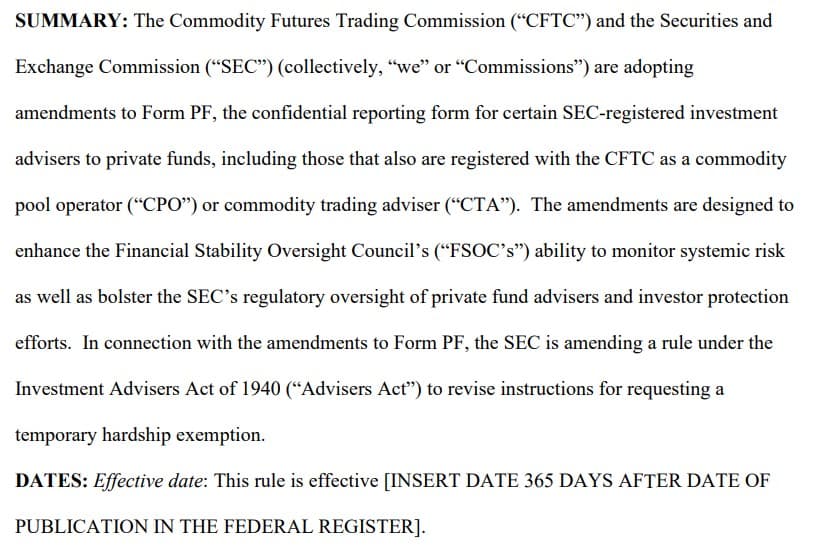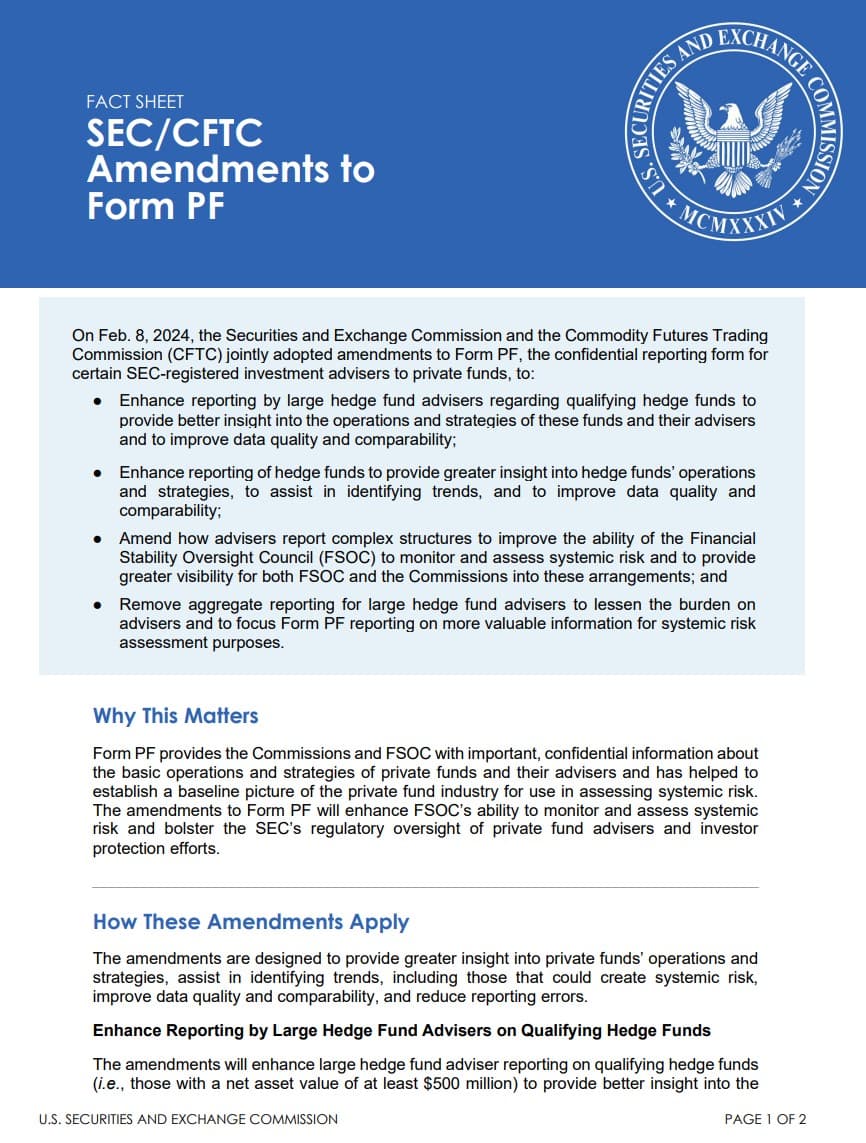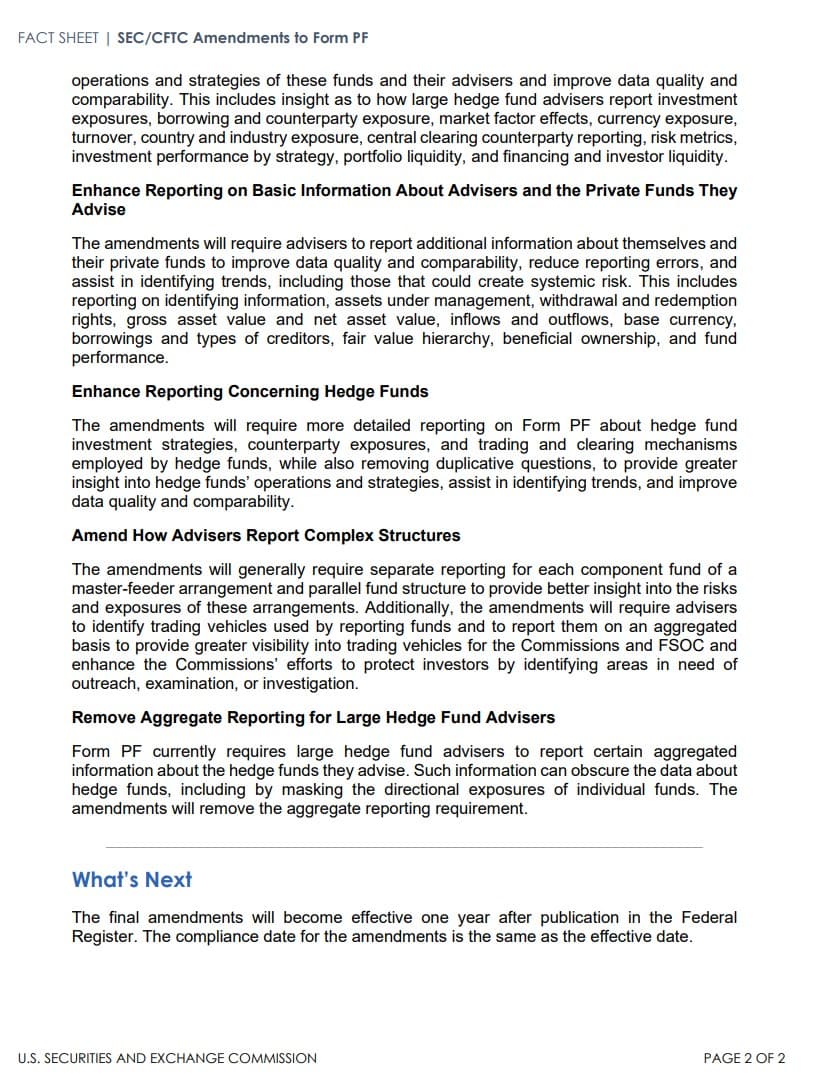Commissioner Mark T. Uyeda: "Apparently, every burden the Commission can possibly conjure is necessary and appropriate in the public interest and for the protection of investors, or for the assessment of systemic risk by FSOC."

Statement on Form PF; Reporting Requirements for All Filers and Large Hedge Fund Advisers
The latest Form PF amendments – the second set of substantive additions within a year – further expand the scope and granularity of information that private funds must report. The comment file is replete with substantive criticism of the expanded reporting requirements. Administrative agencies like the Commission have an obligation to consider and respond to significant comments received during the period for public comment.[1] Regrettably, the Commission dismisses those concerns with assumptions and unsupported conclusory statements.
For example, commenters expressed concern about disaggregating each component fund of a master-feeder arrangement and parallel fund structure.[2] One commenter explained that disaggregated information would be “misleading and difficult to analyze,” and that it is “not the type of information that the Commissions likely would be able to readily and accurately re-aggregate.”[3] The Commission simply “disagree[s],” that the information would be misleading, and notes that it “could, if necessary, aggregate the data to understand the overall fund.”[4] There is no analysis or evidence to support this response. The response’s “could, if necessary” language does not even imply that the Commission needs this information in the first place.
These form amendments also appear to exceed the authority granted to the Commission by Congress. The Investment Advisers Act of 1940 – as amended by Title IV of the Dodd-Frank Act – authorizes the Commission to require private fund advisers to file reports only if “necessary and appropriate in the public interest and for the protection of investors, or for the assessment of systemic risk by [FSOC].”[5] In this manner, Congress limited the Commission’s authority to require private fund advisers to report information on Form PF. However, the Commission only pays lip service to this limitation.
The Commission justifies the various reporting burdens on private fund advisers with a version of the following statement: the new reporting requirement will “[improve] systemic risk assessment and regulator programs to protect investors.”[6] In many cases, the SEC does not even bother to claim that the additional reporting will satisfy the statutory standard, but instead settles for claiming that the reporting may do so.[7]
Apparently, every burden the Commission can possibly conjure is necessary and appropriate in the public interest and for the protection of investors, or for the assessment of systemic risk by FSOC. A limitation is meaningless if no regulatory action would ever run afoul of it. As the Supreme Court has approvingly cited, “[a] statute should be construed so that effect is given to all its provisions, so that no part will be inoperative or superfluous, void or insignificant. . .”[8]
The SEC’s interpretation of Title IV of the Dodd-Frank Act has the practical effect of ignoring the limitation imposed by the statute. Adding conclusory references to “systemic risk” and “investor protection” does not satisfy the authority constraints imposed by statute.
The increasing granularity of the Form PF obligations raises important questions about what measures are being taken to protect the investors in the private funds reporting information on Form PF. These investors seem to have been all but forgotten in the Commission’s quest for ever more detailed and faster reporting of private fund information.
As then-Chair Mary Schapiro stated in 2011 when Form PF was first adopted;
I also know that the confidentiality of the information reported on Form PF is very important to those filing the information. The data is sensitive and proprietary and — by Congressional design — non-public. The Dodd-Frank Act contains strong protection for the information filed on Form PF. In addition, we are committed to building the controls necessary to provide appropriate confidentiality and limit the availability of proprietary hedge fund and other private fund information to those who have a regulatory need to know.[9]
Unauthorized disclosure of Form PF information could cause significant damage. Despite the assurances of then-Chairman Schapiro, raw Form PF data is now being widely distributed throughout the Federal government. Federal agencies are under constant threat of cybersecurity incidents. But even with strong cybersecurity and confidentiality protections, it is not possible for the employees, contractors, and third parties who have access to Form PF data to unlearn what they have observed should they leave federal employment and pursue positions in the private sector, such as competitors in the private funds industry.[10]
The Form PF amendments also represent a shocking deficiency in economic analysis. Two days ago, the Commission adopted rules that scope certain private funds into the definition of “dealer” or “government securities dealer” under the Securities Exchange Act of 1934.[11] In declining to exempt private funds from the definition, the Commission stated that “[a]lthough. . .the [SEC] collects some information about certain private funds through Form PF, this reporting alone is not a sufficient substitute for the comprehensive dealer requirements because, it is not as comprehensive.”[12]
Yet the Adopting Release for these Form PF amendments contains no analysis as to whether the new Form PF reporting obligations are appropriate in light of the newly-imposed overlapping dealer registration regime, with its own reporting requirements.[13] Failure to consider these overlapping obligations makes it impossible for the agency to act on a rational basis as required by the Administrative Procedure Act in considering these amendments.
Finally, I am troubled by the Commission’s approach towards smaller asset managers. The Adopting Release acknowledges the possibility that increased compliance costs will cause “smaller advisers to either exit or forgo entry.”[14] The Commission’s assertion that “the final amendments reduce many of the costs of compliance relative to the proposal. . ., [so] these effects may be mitigated, but may nonetheless occur”[15] is not compelling given that the final amendments make only minor changes from the proposal.[16]
The Commission’s war on private funds continues.[17] While I am unable to support today’s amendments, I thank the staff in the Divisions of Investment Management and Economic and Risk Analysis, as well as the Office of the General Counsel, for their efforts.
[1] See Perez v. Mortgage Bankers Association, 575 U.S. 92, 96 (2015), available at https://supreme.justia.com/cases/federal/us/575/92/.
[2] See, e.g., Comment Letter of Managed Funds Association (Dec. 7, 2022), available at https://www.sec.gov/comments/s7-22-22/s72222-20152435-320304.pdf.
[3] Id. at 4.
[4] See Form PF; Reporting Requirements for All Filers and Large Hedge Fund Advisers, Advisers Act Release No. 6546 (Feb. 8, 2024) (“Adopting Release”), at 191, available at https://www.sec.gov/files/rules/final/2024/ia-6546.pdf.
[5] See 15 U.S.C. 80b–4(b).
[6] See, e.g., Adopting Release, at 194.
[7] Id. (“[T]hese industry insights may improve systemic risk assessment and regulator investor protection efforts.”) (Emphasis added.)
[8] See Hibbs v. Winn, 542 U.S. 88, 101 (2004) (citing 2A N. Singer, Statutes and Statutory Construction §46.06, 181-86 (rev. 6th ed. 2000), available at https://supreme.justia.com/cases/federal/us/542/88/.
[9] Chairman Mary Schapiro, Opening Statement at SEC Open Meeting: Private Fund Systemic Risk Reporting (Oct. 26, 2011), available at https://www.sec.gov/news/speech/2011/spch102611mls.htm.
[10] Despite the vast resources of the Federal government, the neuralyzer remains a work of fiction. See Men in Black, Columbia Pictures (1997).
[11] See Further Definition of ‘As a Part of a Regular Business’ in the Definition of Dealer and Government Securities Dealer in Connection with Certain Liquidity Providers, Release No. 34-99477 (Feb. 6, 2024), available at https://www.sec.gov/files/rules/final/2024/34-99477.pdf.
[12] Id. at 71.
[13] The Adopting Release only mentions the amendments to the definition of “dealer” when analyzing the economic impacts of overlapping compliance dates. See, e.g., Adopting Release, supra note 4, at 221-222. The Adopting Release does not include any analysis as to whether the substantive reporting requirements imposed by the Form PF amendments continue to be appropriate in light of the amendments to the definition of “dealer.”
[14] See, Adopting Release, supra note 4, at 220 – 221.
[15] Id. at 220. (Emphasis added.)
[16] Id. at 7. (Proclaiming that the Commission is “adopting the amendments [to Form PF] largely as proposed. . .” (Emphasis added.))
[17] Commissioner Mark T. Uyeda, Statement on Further Definition of “As a Part of a Regular Business” in the Definition of Dealer (Feb. 6, 2024), available at https://www.sec.gov/news/statement/uyeda-statement-dealer-trader-020624 (“Indeed, following Form PF, the adoption of private fund adviser rules, securities lending disclosure, and short position and short activity reporting, this action feels like another salvo in the Commission’s war on private funds.”).
What Mark is so upset about

Wut Mean?
Among other things, the amendments to Form PF will enhance how large hedge fund advisers report investment exposures, borrowing and counterparty exposure, market factor effects, currency exposure, turnover, country and industry exposure, central clearing counterparty reporting, risk metrics, investment performance by strategy, portfolio liquidity, and financing and investor liquidity to provide better insight into the operations and strategies of these funds and their advisers and improve data quality and comparability.
Further, the amendments will require additional basic information about advisers and the private funds they advise, including identifying information, assets under management, withdrawal and redemption rights, gross asset value and net asset value, inflows and outflows, base currency, borrowings and types of creditors, fair value hierarchy, beneficial ownership, and fund performance to provide greater insight into private funds’ operations and strategies, to assist in identifying trends, including those that could create systemic risk, to improve data quality and comparability, and to reduce reporting errors.
The amendments will also require more detailed information about the investment strategies, counterparty exposures, and trading and clearing mechanisms employed by hedge funds, while also removing duplicative questions, to provide greater insight into hedge funds’ operations and strategies, to assist in identifying trends, and to improve data quality and comparability.
Fact Sheet



TLDRS
- Commissioner Mark T. Uyeda: "Apparently, every burden the Commission can possibly conjure is necessary and appropriate in the public interest and for the protection of investors, or for the assessment of systemic risk by FSOC."
- The amendments to Form PF will enhance reporting by large hedge fund advisers on various aspects such as investment exposures, borrowing, counterparty exposure, risk metrics, and investment performance to improve insight into fund operations and strategies, and enhance data quality and comparability.
- Additional information will be required about advisers and the private funds they manage, including details on assets under management, withdrawal rights, gross and net asset values, inflows and outflows, and fund performance, aimed at providing a deeper understanding of private funds’ operations, assisting in trend identification, and reducing reporting errors.
- The changes will also demand more detailed reporting on investment strategies, counterparty exposures, and trading and clearing mechanisms, while eliminating redundant questions to offer a clearer view of hedge funds’ operations and strategies, help in trend analysis, and enhance data quality and comparability.
- Goes into affect 1 year after being published in the Federal Register.



